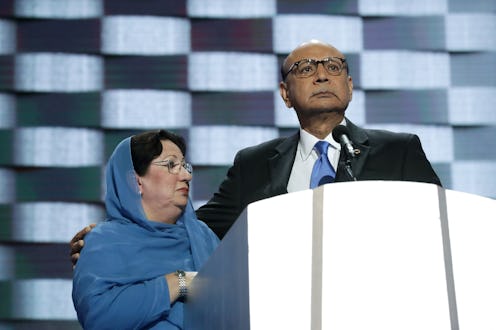News
What The Khans Mean To Me As An Arab Woman
As an Arab-American woman of Muslim immigrant heritage, the rhetoric of this political season has often left me torn between outrage and despair. While blaming minorities and "outsiders" is a time-honored political tradition, the Trump campaign has made an art of the low blow. From demonizing Mexicans to deriding the disabled, the Republican candidate takes apparent pride in violating the basic codes of respectful — or factually accurate — dialogue. What's worse, though, are the festive crowds that flock to Trump and use his bullying tactics as an excuse to air the worst of their own prejudices and fears. Promising to "make America great again" through exclusion and regression, Trump has continued to rise in the polls, while what faith I had in this country's greatness has drained away.
That is, until last week, when something unexpected happened. When Trump decided to take a few cheap shots at Khizr and Ghazala Khan, an immigrant Muslim couple who spoke at the DNC and whose son lost his life serving in the U.S. Army, he probably expected business as usual: that his crass comments would stoke the xenophobia of his base and generate a quick cycle of Twitter attention. Yet what has taken place since has been a quiet riot of dignity and rationality that has unmasked Trump's tactics for what they are: un-American.
Trump lashed out at the couple for their comments criticizing his anti-Muslim stance. Their son saved the lives of his men, Khizr said in his speech, but "if it was up to Donald Trump, he never would have even been in America." Over the weekend, Trump repeatedly criticized the couple in interviews and on Twitter, dismissing their grief and claiming he was "viciously attacked" by Khizr. Never answering the Khan's original critique — that his anti-Muslim policies were wrong-headed and unconstitutional — Trump returned to a familiar tactic: repeating sound bytes about terrorism, and flexing his swollen, if sensitive ego.
In response to Khizr Khan's critique that Trump has never made sacrifices, the Republican candidate responded, "I think I've made a lot of sacrifices. I work very, very hard ... I've had tremendous success. I think I've done a lot."
Like my father, also a Muslim immigrant, the Khans talk about freedom and hope in real terms, because they know what it means to endure the opposite. Ghazala Khan survived war in Pakistan as a teenager; my father was a war refugee twice before he turned ten.
Trump also swung a few particularly low blows at Ghazala, singling her out as a woman and making ignorant insinuations that, as a Muslim female, she is muzzled by her religion. "If you look at his wife, she was standing there. She had nothing to say," speculated Trump. "Maybe she wasn't allowed to have anything to say. You tell me."
Yet Ghazala answered Trump's comments with eloquent simplicity. She was not silenced by her culture, her religion, or her husband, she explained. She was silenced by the savage weight of her grief; 12 years after losing her son, she says, she still cannot see his picture without weeping. "The place that emptied will always be empty," she wrote in The Washington Post. Though she mourns, she is proud and defiant, chiding Trump for his "ignorant" beliefs about her religion and adding, "Donald Trump said he has made a lot of sacrifices. He doesn't know what the word sacrifice means."
Ghazala Khan's strength has spurred many other Muslim women to respond, and the hashtag #CanYouHearUsNow went viral as Twitter flooded with outspoken female voices.
I even chimed in with my own:
Trump's usual tactics of insulting and dismissing his opponents has not worked this time. His increasingly desperate attempts to protect his ego have only augmented his wrongness in the eye of the American public. For once, it seems Trump's egregious comments have moved enough people's sense of decency to trigger visible disgust in the mainstream — even within his own party. This, at least, says something hopeful about our citizens.
At every turn, the Khans have been articulate and earnest examples of American principles. Like my father, also a Muslim immigrant, the Khans talk about freedom and hope in real terms, because they know what it means to endure the opposite. Ghazala Khan survived war in Pakistan as a teenager; my father was a war refugee twice before he turned 10. In responding to Trump's attacks, Khizr and Ghazala have demonstrated a grasp of democratic principles that have been all but lost on Trump: while defending their rights, they have acknowledged that Trump, too, is protected by the First Amendment. "[I] have exactly [the] same rights" as Trump, Khizr said. Their civility and poise has been a credit to anyone who calls themselves American.
The Khans have given us a gift, a moment of reprise. For Americans inclined to believe the worst about Muslims, or about immigrants, the Khans have shown the country the true and best face of Islam. And for those who, like me, have felt tempted to despair, the Khans have articulated the potential for American greatness as only an immigrant can.
Images: Sarah Aziza/Twitter
